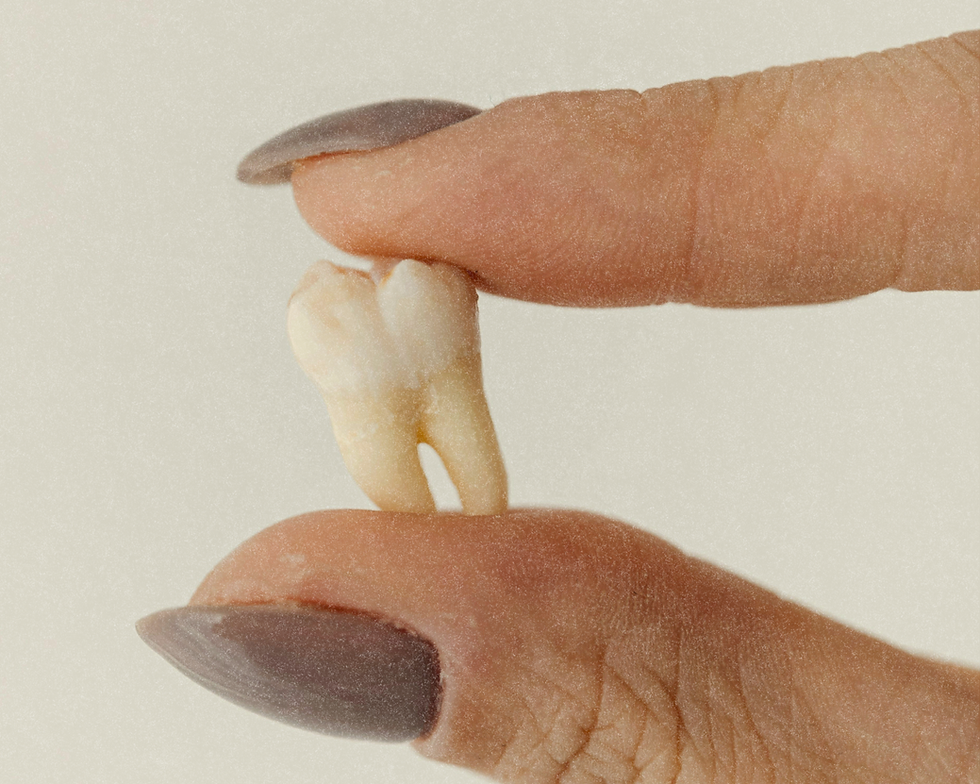The Surprisingly Powerful Way Women Can Fight Back Against Alzheimer's (Oral Care Might be the Most Overlooked Wellness Tool in Your Drawer)
- jennysmithmattfeldt

- Aug 6, 2025
- 4 min read
Updated: Aug 12, 2025
Alzheimer’s and heart disease hit women hardest. And science says your taking care of your teeth might be more important than you think.
By Jenny Smith Mattfeldt | Published August 6, 2025 | Article does contain affiliate links.

Here's what's not being said: over 60% of Alzheimer’s patients are women. Meaning when they discover something that can help you prevent the disease we need to be listening.
Alzheimer’s is one of the most feared diagnoses in modern medicine and for good reason. It’s a disease that steals in slow motion, erasing memories, identities, and relationships over time. And while there’s no magic bullet, the science is clear on this: your daily choices today matter. Including the ones you make with a toothbrush.
In the past few years, research has uncovered a compelling connection between oral health and long-term brain health. In particular, the link between gum disease and Alzheimer's disease has moved from speculative to urgent. If you care about aging well, staying mentally sharp, and protecting your body from the inside out, it's time to take oral care seriously—not as a cosmetic habit, but as foundational wellness.

The Brain-Mouth Connection, Explained
Your mouth is one of the most direct access points to your bloodstream. When your gums are inflamed, whether that's from plaque, infection, or poor dental habits, they create a pathway for bacteria and inflammatory molecules to enter your system. Over time, this can trigger systemic inflammation, one of the key drivers behind most chronic diseases.
In Alzheimer’s research, one bacterial strain has caught particular attention: Porphyromonas gingivalis (P. gingivalis), a common culprit in gum disease. In animal studies, this bacteria has been shown to migrate to the brain, where it may contribute to amyloid-beta plaque formation, a hallmark of Alzheimer’s. And it’s not just animal studies. In human autopsies, P. gingivalis has been found in the brains of Alzheimer’s patients.
Researchers have also discovered that individuals with chronic gum disease or significant tooth loss have a significantly higher risk of developing Alzheimer’s. Some studies suggest the risk is more than double. While more clinical trials are underway, the existing data is enough to make any wellness-minded woman pause.
“We did not expect that the periodontal pathogen would have this much influence on the brain, or that the effects would so thoroughly resemble Alzheimer’s disease,” said Dr. Keiko Watanabe, a periodontist and researcher at the University of Illinois at Chicago.
A Moment on Heart Health
While the focus here is brain health, it’s worth mentioning: gum disease is also strongly linked to heart disease. Heart disease being the number one cause of death for women. Oral bacteria have been found in arterial plaques, and chronic inflammation from the mouth is now considered a risk factor for cardiovascular disease, stroke, and even atrial fibrillation. The same bad habits that quietly undermine your cognitive longevity are often working against your heart, too.

So What Should You Actually Be Doing?
This isn’t about panic or perfection. It’s about being informed. Oral care doesn’t have to be clinical or tedious—it can be ritualistic, grounding, even indulgent. Here are a few evidence-supported, wellness-forward ways to elevate your oral routine:
1. Invest in a Sonic Toothbrush
A high-quality electric toothbrush does more than just buzz—it removes plaque more effectively, helps prevent gum recession, and creates a consistent experience morning and night. Think of it like upgrading from drugstore skincare to pharmaceutical-grade actives.
Try: Philips Sonicare DiamondClean Prestige, Quip Smart Electric Toothbrush
2. Rethink Your Toothpaste
Many traditional formulas use harsh detergents or fluoride levels that don’t work for everyone. Look for clean, remineralizing toothpastes that support enamel health and balance your oral microbiome.
Try: RiseWell Mineral Toothpaste, Boka Ela Mint, David’s Natural Toothpaste
3. Commit to Daily Flossing
No, really. Flossing removes bacteria that your brush simply can’t reach. Cocofloss and expanding flosses make the experience easier, cleaner, and a little more beautiful.
Try: Cocofloss in Mint or Pure Strawberry, Burst Expanding Floss
4. Incorporate Coconut Oil Pulling
Swishing coconut oil in your mouth for 5–10 minutes can help reduce oral bacteria and inflammation. The science is still emerging, but it’s a practice rooted in Ayurvedic tradition that many wellness experts swear by. The science may still be out, but my experience says it's firmly in.
Try: Keeko Oil Pulling Sachets, Skinny & Co. Coconut Oil, or just raw organic coconut oil by the spoonful.
5. Use a Tongue Scraper Every Morning
This ancient tool removes bacteria that builds up overnight and contributes to bad breath and bacterial imbalance. Copper is naturally antimicrobial and adds a satisfying weight to your morning routine.
Try: Copper Tongue Cleaner, Boka Tongue Scraper

The Bottom Line
You don’t have to do everything. But you do need to understand that oral health is whole-body health. If you’re putting energy into eating clean, managing stress, and moving your body, this is one more area to align with that intention.
You deserve to age with clarity, with memory, with vitality. And something as small as your flossing habit might quietly shape that future.
Want more holistic wellness intel like this? Subscribe to the Evrgreen Newsletter!










Comments